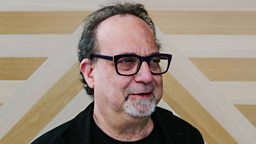Tectonics 2023 Artist Profile
Carl Stone

Carl Stone is one of the pioneers of live computer music, and has been hailed by the Village Voice as “the king of sampling.” and “one of the best composers living in (the USA) today.” He has used computers in live performance since 1986. Stone was born in Los Angeles and now divides his time between Los Angeles and Japan. He studied composition at the California Institute of the Arts with Morton Subotnick and James Tenney and has composed electro-acoustic music almost exclusively since 1972. His works have been performed in the U.S., Canada, Europe, Asia, Australia, South America and the Near East. In addition to his schedule of performance, composition and touring, he is on the faculty of the Department of Media Engineering at Chukyo University in Japan.
A winner of numerous awards for his compositions, including the Freeman Award for the work Hop Ken, Carl Stone is also the recipient of grants from the National Endowment for the Arts, the Rockefeller Foundation and the Foundation for Performance Arts. A winner of numerous awards for his compositions, including the Freeman Award for the work Hop Ken, Carl Stone is also the recipient of grants from the National Endowment for the Arts, the Rockefeller Foundation and the Foundation for Performance Arts. His 3-LP release “Electronic Music from the Seventies and Eighties” on the Unseen Worlds label placed #1 in The Wire Magazine’s “Best of 100” 2016 Archival category (the follow up release the next year ranked #3).
I have been interested in electronics and technology for music making since my studies at CalArts in the 1970s. Although my use predates the term by several decades, my basic technique is what has come to be called "sampling," where found or selected musical material serves as my compositional starting point. I perform most of my music myself using a laptop computer, in real time. These pieces are composed structures. Sometimes they are completely worked out in advance, but often improvisation plays an important role in filling in the details. I frequently use repetition and often limit my materials, so I have sometimes been miscategorized as a minimalist. Although I use—and am very interested in—technology, I consider it an inevitability of my process, not its raison d'être. I want people to somehow forget a computer is involved when listening to my music. I am interested in the transformation of familiar (or seemingly familiar) music, acting as a kind of sonic magnifying glass and revealing some acoustic truth the listener never suspected. I like to combine layers of meaning, stretched over time and cultures. Concretely, I usually take recorded sounds, often music, and subject it to radical transformation in the time or spectral domains, using software that I design myself. I hope to draw the listener into a strange world of altered perception and signification. I am interested in formal structures rooted in games and math, and things like palindromes often find their way into my pieces. I don't mind if my music is sometimes jarring or even a little uncomfortable; but I hope for some kind of beauty to be found there. The evolution of technology over time has enabled me to do things that I either dreamed in the seventies of but couldn't yet do, or hadn't even dreamed of! What used to be done painstakingly with tape-recorders and razor blades can now be done with the press of a key and a click of a mouse. These real-time capabilities have freed me and allowed me to work as a composer-performer and have given me an ability to improvise—something that I had never really done in the first fifteen years of my professional life as a composer.
